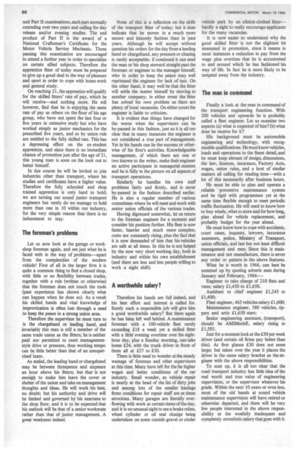The man in command Finally a look at the man
Page 90

If you've noticed an error in this article please click here to report it so we can fix it.
in command of the transport engineering function. With 200 vehicles and upwards he is probably called a fleet engineer. Let us examine two aspects (a) what is expected of him? (b) what does he receive for it?
His background must be automobile engineering and technology, with recognizable qualifications. He must know vehicles, loads and operations to the finest detail, and he must keep abreast of design, dimensions, the law, licences, insurance, Factory Acts, wages, union rules, and a host of similar matters all calling for reading time—with a lot of this necessarily after business hours.
He must be able to plan and operate a reliable preventive maintenance system and be rigid with programmes yet at the same time flexible enough to meet periodic traffic fluctuation. He will need to know how to buy wisely, what to store and for how long, plan ahead for vehicle replacement, and probably budget for the year ahead.
He must know how to cope with accidents, court cases, inquests, lawyers, insurance assessors, police, Ministry of Transport, union officials, and last but not least difficult management and men. Since this is maintenance and not manufacture, there is never any order or pattern in the above features.
What he is worth in 1966, can best be summed up by quoting adverts seen during January and February, 1966:— Engineer to take charge of 210 flats and vans; salary £1,450 to £1,650.
Assistant to chief engineer £1,245 to £1,400; Fleet engineer, 465 vehicles salary £1,600; Maintenance engineer, 380 vehicles, tippers and attic £1,650 start; Senior engineering assistant, (transport), should be AMIMechE, salary rising to £1,585.
Just for a moment look at the £30 per week driver (and certain oil firms pay better than this). At first glance £30 does not seem large; but taken over the year it places the driver in the same salary bracket as the engineer with the above responsibilities.
To sum up, it is all too clear that the road transport industry has little idea of the real worth and true value of engineering supervision, or the supervisor whatever his grade. Within the next 10 years or even less, most of the old hands at sound vehicle maintenance supervision will have retired or otherwise departed, and there will be very few people interested in the above responsibility at the woefully inadequate and completely unrealistic salary that goes with it.




































































































































































